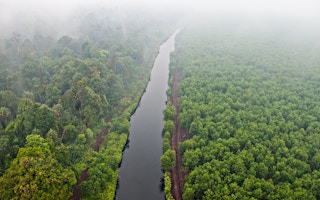A plan by one of Indonesia’s largest pulp and paper companies to ramp up production in the Indonesian province of Riau, Sumatra, has alarmed environmental groups.
Asia Pacific Resources International Limited, or APRIL, is slated to boost capacity by signicantly expanding its mill operations in the heartland of Indonesia’s pulpwood industry.
Riau is home to APRIL’s main pulp and paper subsidiary, Riau Andalan Pulp & Paper (PT RAPP), which plans — subject to approval by the local authorities — to increase pulp capacity to 5.8 million tonnes per year, and production of paperboard of 2.9 million tonnes per year, according to data from PT RAPP’s environmental impact assessment. If approved, the first phase of new production capacity will come online in 2025.
APRIL says that it will increase production by improving the productivity and efficiency of its operations and will not expand its plantations. But environmental groups question where the wood will come from to meet such a large increase in capacity.
According to a calculation made by Eyes on the Forest (EoF), a coalition of non-governmental organisations (NGOs) that investigates forest clearing and land-grabbing in Indonesia, APRIL’s capacity increase could put about 120,000 hectares of natural forests at risk every year to feed its mills.
APRIL told Eco-Business that its growth plans are in line with the company’s sustainability policy, which has ruled out clearing natural forests for the past six years. APRIL2030, a net-zero commitment made last year by the company, will stop the expansion of any of its current land concessions.
Christopher Barr, executive director of Woods & Wayside International, a non-profit that analyses Indonesia’s pulp industry, said that APRIL’s mill expansion would increase its annual wood consumption in Indonesia by more than 50 per cent if fully implemented. Meeting this demand “will create significant challenges for APRIL’s wood supply and intensify pressures on the resource base for decades to come,” he said.
“We all need to be asking what risks this poses for deforestation, conversion of carbon-rich peatlands, and conflicts with local communities,” he told Eco-Business.
Riau is known for its peatlands, however the area has experienced Indonesia’s highest rates of deforestation in recent years, and has lost about half of its forest cover. The area is also fire-prone. The drainage of peat to plant acacia and eucalyptus, the crops of the pulp and paper industry, leaves it vulnerable to fire, resulting in the outbreaks of haze air pollution that blight much of Southeast Asia almost every year.
Barr said he is “not optimistic” APRIL can meet such a large increase in wood demand from its existing plantations alone, and called on APRIL to release a detailed wood supply plan for public review by independent experts.
APRIL said that it is self-sufficient in fibre supply, and increased efficiencies, productivity gains and land optimisation will mean that it will not need to source fibre outside of its own concessions and supply chain. “APRIL has not applied for additional industrial plantation licenses, nor do we plan to do so,” the company said.
Questions about APRIL’s expansion plans come four years after similar concerns were raised over the opening of a large pulpwood mill in South Sumatra by APRIL’s key competitor, Asia Pulp and Paper (APP).
APRIL and APP, which combined control 80 per cent of Indonesia’s pulpwood industry, have both made high-level commitments to stop clearing rainforests to expand their operations following years of campaigning from environmental groups. These commitments have been called into question over their use of suppliers linked to deforestation.
APRIL, and parent company Royal Golden Eagle, produced a zero-deforestation policy in 2015 after years of being labelled an industry laggard in tackling deforestation. APRIL has invested millions in infrastructure and social programmes to prevent and suppress fire in peatland areas, and points to the Restorasi Ekosistem Riau (RER), a forest restoration area in Riau, to showcase its conservation efforts.
A report from a coalition of non-government organisations, published in 2019, warned that the presence of agribusinesses on peatlands poses an ongoing threat to these climate-critical areas, which act as powerful carbon sinks. The report highlighted that APRIL and other high-profile pulpwood companies have pumped money into projects that have increased land-use pressure on drained peatlands while promoting their sustainability and fire control efforts.
APRIL has argued that it is committed to “responsible, science-led forestry” on peatland, and said it is legally obliged to continue operations on its licensed peatland concession areas. About half of APRIL’s 480,000 hectares of cultivated land are on peat.
To continue reading, subscribe to Eco‑Business.
There's something for everyone. We offer a range of subscription plans.
- Access our stories and receive our Insights Weekly newsletter with the free EB Member plan.
- Unlock unlimited access to our content and archive with EB Circle.
- Publish your content with EB Premium.








